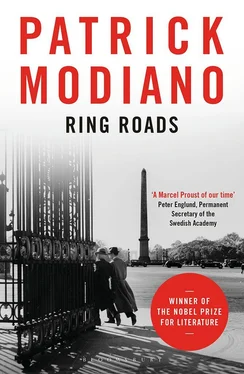Patrick Modiano - Ring Roads
Здесь есть возможность читать онлайн «Patrick Modiano - Ring Roads» весь текст электронной книги совершенно бесплатно (целиком полную версию без сокращений). В некоторых случаях можно слушать аудио, скачать через торрент в формате fb2 и присутствует краткое содержание. Год выпуска: 2015, Издательство: Bloomsbury Paperbacks, Жанр: Современная проза, на английском языке. Описание произведения, (предисловие) а так же отзывы посетителей доступны на портале библиотеки ЛибКат.
- Название:Ring Roads
- Автор:
- Издательство:Bloomsbury Paperbacks
- Жанр:
- Год:2015
- ISBN:нет данных
- Рейтинг книги:3 / 5. Голосов: 1
-
Избранное:Добавить в избранное
- Отзывы:
-
Ваша оценка:
- 60
- 1
- 2
- 3
- 4
- 5
Ring Roads: краткое содержание, описание и аннотация
Предлагаем к чтению аннотацию, описание, краткое содержание или предисловие (зависит от того, что написал сам автор книги «Ring Roads»). Если вы не нашли необходимую информацию о книге — напишите в комментариях, мы постараемся отыскать её.
The Night Watch
Ring Roads — читать онлайн бесплатно полную книгу (весь текст) целиком
Ниже представлен текст книги, разбитый по страницам. Система сохранения места последней прочитанной страницы, позволяет с удобством читать онлайн бесплатно книгу «Ring Roads», без необходимости каждый раз заново искать на чём Вы остановились. Поставьте закладку, и сможете в любой момент перейти на страницу, на которой закончили чтение.
Интервал:
Закладка:
Did he wonder what I was doing there, standing on the other side of the gate?
Eventually, thanks to dogged persistence, I got to know them better. It being July, work didn’t keep them in Paris and they ‘made the most’ of the country (as Murraille put it). All the time I spent with them, I listened to them talking, ever meek and attentive. On scraps of paper, I jotted down the information I gleaned. I know the life stories of these shadows is of no great interest to anyone, but if I didn’t write it down, no one else would do it. It is my duty, since I knew them, to drag them — if only for an instant — from the darkness. It is a duty, but for me it is also a necessary thing.
Murraille . At a young age, he started hanging out at the café Brabant with a group of journalists from Le Matin . They persuaded him to get into the business. Which he did. At twenty, general dogsbody, then secretary to a man who published a scandal sheet he used to blackmail victims. His motto was: ‘Never threaten; only coerce.’ Murraille was sent to the victims’ homes to collect the envelopes. He remembered the frosty welcome. But there were some who greeted him with obsequious politeness, begging him to intercede with his editor, to ask him to be less demanding. These were the ones who had ‘every reason to feel guilty’. After a while, he was promoted to sub-editor, but the articles he was called on to write were of a terrifying monotony, and they all began with: ‘We hear from a reliable source, that Monsieur X. .’ or: ‘How is it that Monsieur Y. .’ or ‘Can it be true that Monsieur Z. .’ There followed ‘revelations’ that, at first, Murraille felt ashamed to be spreading. His editor suggested he always end with a little moral maxim such as: ‘The wicked must be punished’, or by what he called ‘a hopeful note’: ‘We hold out hope that Monsieur X. . (or Monsieur Y. .) will find his way back to the straight and narrow. We feel sure that he will, because, as the evangelist says “each man in his darkness goes towards the light”,’ or some such. Murraille felt a brief twinge of conscience every month when he collected his salary. Besides, the offices of 30b Rue de Gramont — the peeling wallpaper, the dilapidated furniture, the meagre lighting — were conducive to depression. It was all far from cheering for a young man his age. If he spent three years there, it was only because the perks were excellent. His patron was generous and gave Murraille a quarter of the proceeds. The same editor (apparently, a dead ringer for Raymond Poincaré) was not without a sensitive streak. He had bouts of black depression when he would confide to Murraille that he had become a blackmailer because he was disillusioned by his fellow man. He had thought they were good — but had quickly realised his mistake; so he had decided to tirelessly condemn their vile deeds. And to make them PAY. One evening, in a restaurant, he died of a heart attack. His last words were: ‘If you only knew. .!’ Murraille was twenty-five. These were difficult times for him. He worked as film and music-hall critic for several second-rate papers.
He quickly developed an appalling reputation in the newspaper world, where he was currently regarded as a ‘rotten apple’. Though this saddened him, his laziness and his taste for easy living made it impossible for him to change. He had a permanent fear of being short of money, the very prospect threw him into a state of panic. At times like this, he was capable of anything, like an addict desperate for a fix.
When I met him, his star was on the rise. He was editor of his own magazine. ‘Troubled times’ had made it possible for him to realise his dream. He had exploited the chaos and the murk. He felt perfectly at home in this world which seemed hell bent on destruction. I often wondered how a man who looked so distinguished (everyone who met him will tell you about his unaffected elegance, his frankness) could be so utterly devoid of scruples. There was one thing I liked a lot about him: he never deluded himself. A friend from his old regiment had once accidentally shot him while cleaning his gun; the bullet had missed his heart by inches. I often heard him say: ‘When I’m condemned to death and they order a firing squad to put twelve bullets in me, they can save a bullet.’
Marcheret was originally from the Quartier des Ternes. His mother, a colonel’s widow, had done her best to bring him up correctly. She felt old before her time, and threatened by the outside world. She had hoped her son would go into the church. There, at least, he might be safe. But Marcheret, from the age of fifteen, had only one idea: to get away from their dingy apartment on the Rue Saussier-le-Roi, where the photograph of Maréchal Lyautey on the wall gently watched over him. (The photograph even bore an inscription: ‘To Colonel de Marcheret. With fond wishes, Lyautey.’) All too soon, his mother had genuine cause for concern: he was lazy and neglected his studies. He was expelled from the Lycée Chaptal for fracturing another pupil’s skull. Frequented the cafés and the fleshpots of Paris. Played billiards and poker into the early hours. Needed money constantly. She never reproached him. Her son was not to blame, but the others, the bad boys, the communists, the Jews. How she longed for him to stay safely in his room. . One night, Marcheret was strolling along the Avenue de Wagram. He felt the familiar surge of frustration twenty-year-olds feel when they don’t know what to do with their life. The guilt he felt at causing his mother grief was mingled with anger at the fact he had only fifty francs in his pocket. . Things could not carry on like this. He wandered into a cinema showing Le Grand Jeu with Pierre-Richard Willm. The story of a young man who sets off to join the Foreign Legion. It was as though Marcheret was seeing himself up on the screen. He sat through two screenings, enthralled by the desert, the Arabic town, the uniforms. At 6 p.m. he walked into the nearest café as Legionnaire Guy de Marcheret and ordered a blanc-cassis . Then a second. He signed up the next day.
In Morocco, two years later, he heard about his mother’s death. She had never recovered from his leaving. Hardly had he confided his grief to one of his barrack-room mates, a Georgian by the name of Odicharvi, than the man dragged him off to a Bouss-Bir establishment that was part brothel, part cafe. At the end of the evening, his friend had the marvellous idea of raising a glass, pointing towards Marcheret and shouting: ‘Let’s drink to the orphan!’ He was right. Marcheret had always been an orphan. And in enlisting in the Legion, he had hoped to find his father. But he had found only loneliness, sand and the mirages of the desert.
He returned to France with a parrot and a dose of malaria. ‘What pisses me off about things like that,’ he told me, ‘is that no one comes to meet you at the station.’ He felt out of place. He was no longer accustomed to the bright lights and the bustle. He was terrified of crossing the street, and in a blind panic on the Place de l’Opéra, asked a policeman to take his hand and lead him across. Eventually he was lucky enough to meet another former Legionnaire who ran a bar on the Rue d’Armaille. They swapped stories. The bar owner took him in, fed him, adopted the parrot, and in time Marcheret began to enjoy life again. Women found him attractive. This was in an era — so distant now — when being a Legionnaire made women’s hearts flutter. A Hungarian countess, the widow of a wealthy industrialist, a dancer at the Tabarin — in fact ‘blondes’ as Marcheret put it — fell for the charms of this sentimental soldier, who turned a healthy profit from the swooning sighs. Sometimes he would show up in night clubs in his old uniform. He was the life and soul of the party.
Читать дальшеИнтервал:
Закладка:
Похожие книги на «Ring Roads»
Представляем Вашему вниманию похожие книги на «Ring Roads» списком для выбора. Мы отобрали схожую по названию и смыслу литературу в надежде предоставить читателям больше вариантов отыскать новые, интересные, ещё непрочитанные произведения.
Обсуждение, отзывы о книге «Ring Roads» и просто собственные мнения читателей. Оставьте ваши комментарии, напишите, что Вы думаете о произведении, его смысле или главных героях. Укажите что конкретно понравилось, а что нет, и почему Вы так считаете.












